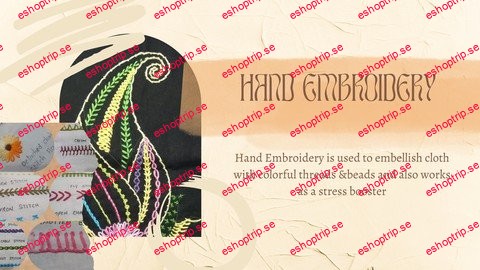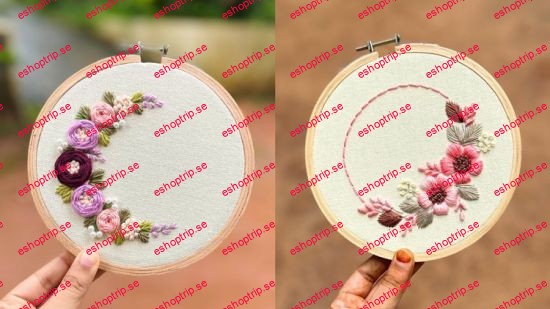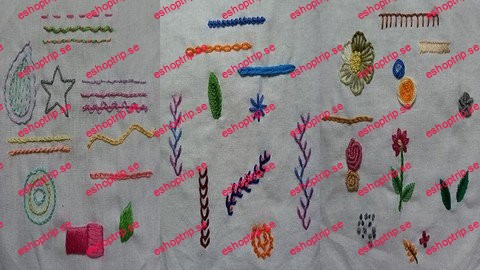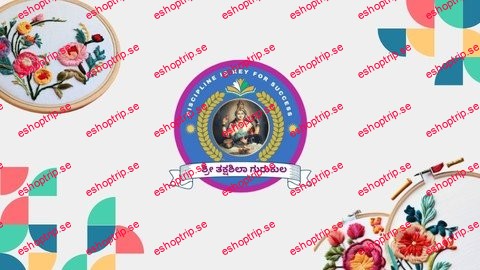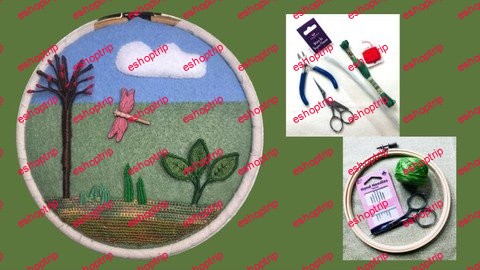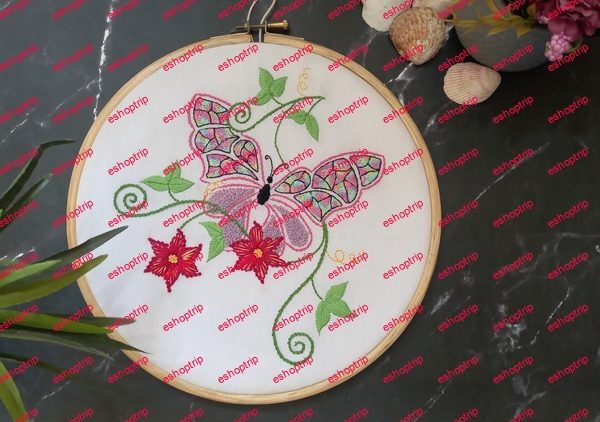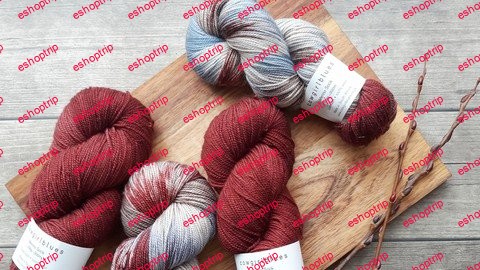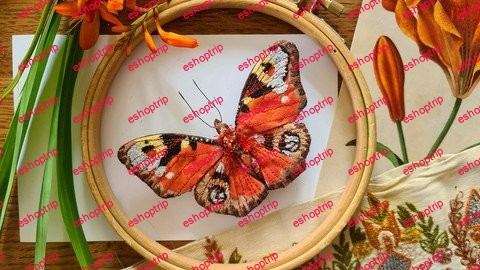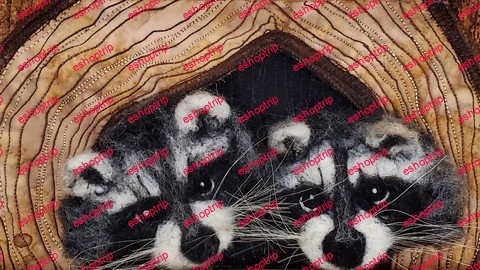Last updated 7/2023
MP4 | Video: h264, 1280×720 | Audio: AAC, 44.1 KHz
Language: English | Size: 10 GB | Duration: 7h 31m
This course will cover up, prepare yourself before beginning, 4 leaves, 6 flowers n 1 paisley pattern
What you’ll learn
50 Advance Stitches
4 types of flower
4 types of leaves
How to trace design onto fabric
How to implement stitches into design or patterns
How to prepare your own DIY embroidery hoops
Requirements
You need no experience, you need to have an Interest in learning this Art.
You will need some basic materials
1. Cotton Fabric, preferably white or any light shade fabric
2. Hand sewing needle, (chenille no. 20-24)
3. Cotton Embroidery floss- 5-6 different shades
4. A pair of Scissor, Small ruler, Pencil, (Heat resistance or Water soluble pen, Optional)
5. Wooden hoop/ plastic hoop, preferable 5 or 6 no.
6. Tracing paper
7. Embroidery Stand (optional)
Description
Hello friends,My name is Insiyah, am a freelance embroidery artist. I was introduced to this beautiful art form by my mother at a very young age, where she taught me basic hand stitches and later when I pursued my career in fashion school, I was introduced to the whole new world of Embroidery, from there my interest grew, my hobby turned into passion and later into professional.. we will begin the course by learningBasic material required for embroideryHow to split the threads, length required for embroidery, thread the needle & tie knotHow to begin a stitch & how to end itHow to trace designHow to fix the hoopHow to finish backside of hoopWe will begin learning these stitches on straight, parallel lines first, after we have practiced enough than will learn how to fill a beautiful Arabic motif.After this course you will be able to make your own DIY hoops, Art frames, Embroider dresses, motifs, Bags, Cushion covers, Table mats, Cuffs, collars and much more….To begin learning this course you need to have a Basic knowledge about embroidery and need to have an interest in learning this art form.These course is open for all those who are interested to learn this beautiful art form which has being going around from centuries, and will always be useful and helpful to you throughout your lifetime.The “Perfect” Stitch Historically, the principal difference between good n bad embroidery was defined by the art of creating a perfectly neat, even stitch.once you have learned to do these stitches properly, you will be able to use them properly, you will be able to use them appropriately and with ease in any piece of work, freestyle or traditional. you can then look at the more advance variations and choose your stitch with full knowledge of their potential within the composition you wish to create.
Overview
Section 1: Introduction to Advance Stitches
Lecture 1 Material required
Lecture 2 How to pull thread from floss
Lecture 3 How to separate or split thread from floss
Lecture 4 How to thread the needle n tie knot
Lecture 5 How to Trace design
Lecture 6 Attach hoop to fabric
Lecture 7 How to adjust Hoop
Lecture 8 Finish backside of hoop
Section 2: Straight Stitch family
Lecture 9 Double Running Stitch
Lecture 10 Split Stitch
Lecture 11 Fern Stitch
Lecture 12 Chevron Stitch
Lecture 13 Seed Stitch
Lecture 14 Straight Stitch
Section 3: Satin Stitch Family
Lecture 15 Long n Short Satin Stitch
Lecture 16 Raised Satin Stitch
Section 4: Knotted Stitch Family
Lecture 17 Coral Stitch
Lecture 18 Scroll Stitch
Lecture 19 Portuguese knotted stem stitch
Lecture 20 Knotted Chain Stitch
Lecture 21 Knotted Buttonhole Stitch
Lecture 22 Double Knot Stitch
Lecture 23 4 legged knot stitch
Lecture 24 Bullion Stitch
Lecture 25 Chinese knot
Section 5: Looped Stitch Family
Lecture 26 Chequered Chain stitch
Lecture 27 Heavy Chain Stitch
Lecture 28 Cable Chain Stitch
Lecture 29 Closed Buttonhole Stitch
Lecture 30 Cretan Stitch
Lecture 31 Braid Stitch
Lecture 32 Double feather stitch
Lecture 33 Feather chain stitch
Lecture 34 Ladder Stitch
Lecture 35 Wheatear Stitch
Lecture 36 Fly Stitch
Lecture 37 Petal Chain Stitch
Section 6: Laced Stitch Family
Lecture 38 Whipped Running Stitch
Lecture 39 Whipped Stem Stitch
Lecture 40 Threaded Back Stitch
Lecture 41 Pekinese Stitch
Lecture 42 Wave Stitch
Lecture 43 Interlaced Band Stitch
Lecture 44 Tied Herringbone stitch
Section 7: Cross-Stitch Family
Lecture 45 Star filling stitch
Lecture 46 St. George Cross Stitch
Lecture 47 Two sided cross stitch
Lecture 48 Ermine stitch
Section 8: Flowers & Leaves
Lecture 49 Open Fishbone Stitch
Lecture 50 Romanian Stitch
Lecture 51 Fishbone Stitch
Lecture 52 Leaf Stitch
Lecture 53 Bullion Rose: Part 1
Lecture 54 Bullion Rose: Part 2
Lecture 55 Woven wheel 1
Lecture 56 Woven wheel 2
Lecture 57 Woven Spider web
Lecture 58 Buttonhole Flower
Lecture 59 Lazy Daisy flower
Section 9: Paisley Pattern 1
Lecture 60 Outline of motif: Part 1 of 7
Lecture 61 Filling of motif: Part 2 of 7
Lecture 62 Filling of motif: Part 3 of 7
Lecture 63 Filling of motif: Part 4 of 7
Lecture 64 Filling of leaves Part 5 of 7
Lecture 65 Filling of leaves: Part 6 of 7
Lecture 66 Flower: Part 7 of 7
Lecture 67 Paisley Pattern
Section 10: Illustration of Stitches
Lecture 68 Illustration n notes of Stitches that we have learnt in this section.
Anyone and everyone can learn this course from a young child to an Adult, Working person to housemakers, Women’s n Men’s.,Those who want to make a career, a fashion designer, person who owns a boutique
Homepage
